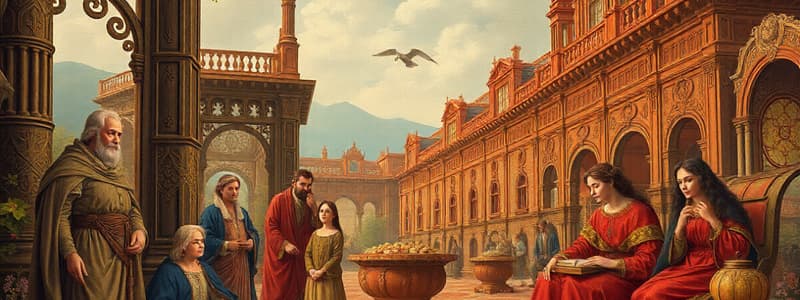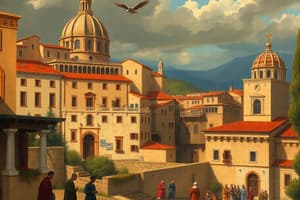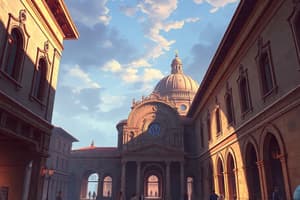Podcast
Questions and Answers
What cultural movement began to gain momentum in Italy during the 14th century?
What cultural movement began to gain momentum in Italy during the 14th century?
Humanism
The invention of the Gutenberg printing press in 1450 did not affect communication in Europe.
The invention of the Gutenberg printing press in 1450 did not affect communication in Europe.
False (B)
Who was responsible for painting 'The Mona Lisa'?
Who was responsible for painting 'The Mona Lisa'?
Leonardo da Vinci
Who is considered the father of modern philosophy?
Who is considered the father of modern philosophy?
What significant socio-political and religious upheaval did King Henry VIII initiate in the 16th century?
What significant socio-political and religious upheaval did King Henry VIII initiate in the 16th century?
Which of the following factors contributed to the emergence of the Renaissance in England? (Select all that apply)
Which of the following factors contributed to the emergence of the Renaissance in England? (Select all that apply)
Match the following major Renaissance writers with their notable works:
Match the following major Renaissance writers with their notable works:
What was the primary influence of the humanist movement in England?
What was the primary influence of the humanist movement in England?
Flashcards are hidden until you start studying
Study Notes
The Renaissance
- A cultural movement that originated in Italy in the 14th century.
- Emphasized human potential and achievements in education, arts, literature, and science.
- The invention of the printing press in 1450 facilitated the spread of ideas and humanist texts.
Key Figures of the Renaissance
- Leonardo da Vinci: A polymath who excelled in painting, architecture, and invention. His famous works include "The Mona Lisa" and "The Last Supper".
- Desiderius Erasmus: A Dutch scholar considered a defining figure of Northern European humanism. Known for translating the New Testament into Greek.
- Rene Descartes: A French philosopher and mathematician regarded as the father of modern philosophy. Famous for his statement "I think; therefore I am".
- Galileo Galilei: An Italian astronomer, physicist, and engineer who made significant contributions to astronomy through the use of telescopes. He was placed under house arrest for his support of a heliocentric universe.
- Nicolaus Copernicus: A Polish mathematician and astronomer who proposed the heliocentric model of the Solar System.
- Thomas Hobbes: An English philosopher known for his work "Leviathan", which explored political philosophy.
The Emergence of the English Renaissance
- The Hundred Years' War (1337-1453): A conflict between England and France that had a profound impact on English society.
- The Wars of the Roses (1455–1487): A series of civil wars between the houses of York and Lancaster that further shaped the English political landscape.
- The English Reformation:
- Initiated by King Henry VIII in the 16th century.
- Marked a significant religious and political shift.
- Henry VIII's desire to annul his marriage to Catherine of Aragon led to a break with the Roman Catholic Church.
- Established the Church of England and the dissolution of monasteries
- Printing and the Spread of Ideas:
- The introduction of the printing press to England in the late 15th century contributed to the spread of knowledge and ideas.
- Made classical texts and literature more accessible to a wider audience.
- Trade and Commerce:
- England's expanding trade and commerce, including the growth of the woolen cloth industry, contributed to economic prosperity.
- This economic growth fostered patronage of the arts and education, promoting cultural innovation.
- Patronage by the Tudor Monarchs:
- The Tudor monarchs, including Henry VII, Henry VIII, and Elizabeth I, were patrons of the arts and literature.
- This royal support fostered the development of English literature, education, and cultural achievement.
- Humanism and the Influence of Italy:
- Humanist ideas and works from Italy, particularly those of Petrarch, Dante, and Boccaccio, influenced English thought.
- This influence fostered a renewed interest in classical learning and the humanities.
Major Renaissance Writers
- Sir Thomas Wyatt
- Sir Thomas More
- Christopher Marlowe
- Ben Jonson
- William Shakespeare
- Edmund Spenser
- John Milton
- William Tyndale
- William Campion
- Nicholas Udall
- John Skelton
- Earl of Surrey
- Thomas Kyd
- John Webster
Renaissance Poets
- The text mentions a class activity requiring students to read and discuss poems by Renaissance poets.
- The text provides a link to an online resource about religious themes in Renaissance literature.
Studying That Suits You
Use AI to generate personalized quizzes and flashcards to suit your learning preferences.



